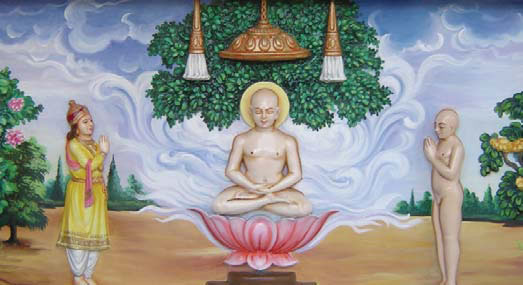Introduction
In today’s fast-paced world, many individuals experience stress, anxiety, and a sense of disconnection. For spiritual seekers and wellness enthusiasts, finding a path to inner peace and balance is paramount. Observing Jain Chaturmas offers a structured period of reflection, discipline, and spiritual growth, providing tools to navigate modern life’s challenges with clarity and serenity.
Understanding Jain Chaturmas
Jain Chaturmas, also known as Chomasa, is a four-month period during the monsoon season when Jain monks and nuns stay in one place, intensifying their spiritual practices. For laypersons, it’s a time to engage in vows, fasting, and other religious activities to enhance spiritual growth. In 2025, Chaturmas begins on July 6 (Ashadha Shukla Ekadashi) and concludes on November 3 (Kartik Shukla Ekadashi).
Benefits of Observing Jain Chaturmas in the Modern World
1. Mental Clarity and Emotional Balance
Practices like Samayik (meditation) and Pratikraman (introspection) encourage mindfulness and self-awareness. Regular engagement in these rituals helps reduce stress, manage emotions, and foster a sense of inner peace.
2. Physical Health and Wellness
Fasting and dietary restrictions during Chaturmas, such as consuming simple, non-spicy foods and avoiding root vegetables, aid in detoxifying the body and improving digestion. These practices align with modern health principles promoting gut health and overall well-being.
3. Enhanced Self-Discipline
Observing vows and adhering to a structured routine during Chaturmas cultivates self-control and discipline. This discipline extends beyond the spiritual realm, positively impacting personal and professional aspects of life.
4. Community Engagement and Social Harmony
Chaturmas fosters a sense of community through collective prayers, discourses, and charitable activities. Engaging in these communal practices strengthens social bonds and promotes a spirit of cooperation and empathy.
5. Environmental Consciousness
The principle of Ahimsa (non-violence) emphasized during Chaturmas extends to all living beings, encouraging environmentally friendly practices. Avoiding harm to insects and microorganisms during the monsoon season reflects a commitment to ecological preservation.
FAQs
Q: Can non-Jains participate in Chaturmas practices?
A: Yes, individuals from all backgrounds can adopt the principles of Chaturmas, such as mindfulness, fasting, and ethical living, to enhance their spiritual and personal growth.
Q: Are there specific texts associated with Chaturmas?
A: The Kalpa Sutra is prominently studied during this period, detailing the lives of Tirthankaras and monastic conduct.
Q: How does Chaturmas align with modern wellness practices?
A: The emphasis on meditation, dietary discipline, and ethical living during Chaturmas parallels contemporary approaches to holistic health and mindfulness.
Conclusion
Jain Chaturmas offers timeless practices that address the complexities of modern life. By embracing its principles, individuals can achieve mental clarity, physical health, and spiritual fulfillment. Whether through meditation, disciplined living, or community engagement, Chaturmas provides a pathway to a balanced and harmonious life.
